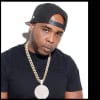The producer is one of the most crucial yet anonymous figures in all of music. In some songs, the producer is both the band leader and the band, yet his or her name is often unknown. Every other week, with Beat Construction, an extension of our column in the magazine, we aim to illuminate the role producers are playing in creating some of our favorite music. This week, we talk with Brooklynite Harry Fraud, who has served as French Montana’s go-to beat connect in recent years, providing the rising star with hits like "Shot Caller" and "New York Minute" while also lacing the likes of Action Bronson, Prodigy and Smoke DZA with his hazed out sound. Read an interview with him below and click to the next page to hear some of his best productions.
What first drew you to music? There was always music being played at my home, my parents were both musicians. My father played guitar and my mom was a singer and they would play in a band together so they would always be doing gigs and shit when I was little kid so it was just real natural for me to get into doing music. It was just something that was right in front of me. My father was a producer of concerts and he managed a lot of big selling artists. He ran [shows at] Madison Square Garden and at Jones Beach Theater for a number of years—Elton John or fucking Rolling Stones or some crazy band. I was always getting to go see the best artists in the world perform when I was growing up. There was just a real diverse palette of sounds that he was working with, so for me it was never just one thing being played at my house.
Do you have any memories of being around stars of that level? I can just remember, for instance, going to dinner at Jones Beach Theater and sitting in the dressing room with Tina Turner and just cooling out, being a little kid. I remember sitting with the Beach Boys at the side of the stage when they were on tour and Carlos Santana playing on stage. All these different artists that were very successful but at the same time very tangible. I'm not one to ever be star stuck or anything like that because it was never really a big thing. That was just regular shit.
I saw a French Montana interview where he said your dad managed the Beatles. [Laughs] That's an exaggeration! He didn't. But he managed a bunch of different bands, probably one of the more successful ones would be Sugar Ray, he managed them at their height and he still manages [lead singer] Mark McGrath. He's really worked more on the production side of things with everybody, in terms of producing live shows.
What drew you to hip-hop around all of this? I mean, I grew up in Brooklyn so that was the music that was around me. I was real into Wu-Tang but then I was also into West Coast rap—Snoop and Dre and Ice Cube and Ice-T. Those four I listened to heavy when I was a kid. I remember my father got me an Ice-T tape and I would just ride out. My mom really wasn't into it, my mom felt like it was misogynistic and I was too young to listen to all of this. You know, as good moms usually do. But I was on it once I heard it. That type of rap is very melodic, there's a lot of musicality to it. I think I was just drawn to because I related that to a lot of the music that I had already heard.
Did you play instruments growing up? My father had me take guitar lessons when I was young. I took it for a couple years, and I can still fiddle with it, but I didn't really take it that far. And then in school I played clarinet and sang in the chorus and all that shit and took my music theory classes. Anything I could do with music I did it. And as soon as I could get a set of turntables, I got 'em. I was probably like 13 or 14. From there I kinda [focused on hip-hop]. Not that I didn't listen to other music because I'm a humungous rock n' roll fan, from '60s rock to '90s rock. Not really the super new stuff, but I like a little shit here and there. But as soon as I got turntables I was gone on playing any instruments.
When did you jump into production on a professional level? I always looked at it as my job, even when it wasn't really paying me. Even when I was in college I was way more focused on being in my crib, in the studio I had set up in my apartment and making sure every day I figured something out. I always took this very seriously. As you start to feel more confident in your abilities then you start to put yourself out there more. You feel okay about running up on people and playing them some shit. I think through that I started to use the little connections that I had to try and parlay records. And obviously when I linked up with French he already had such an organic independent movement that was building and taking shape, I was a perfect fit into that. We just started to move together.
How'd you guys first meet? I had a studio in the city and I was working with an artist who had purchased a feature from French. They just wanted me to mix it, it wasn't my production. So I mixed it for them and when they played it for him they played him some of my beats too and I think he just liked what he heard. He got in touch with me and came to my studio one day. I played him a lot of beats that day and we just started working. But it wasn't like we jumped in and made a million songs. We started working slowly because he was already doing what he was doing. I kinda just fit in how I fit in, slowly but surely.
You guys seem like a great fit. Yeah I think so too, but I also think that comes with working real close with somebody. You start to understand what they like. I know how to cater to him.
What type of gear are you working with? Everything ends up in Pro Tools but I'm working with a lot of Korg outboard keyboards like the MicroKorg and the Triton. I also use a lot of the synths that are in Logic, but what I'll do is take Logic on my laptop, setup the synth and then run the outputs of Logic into Pro Tools. Because I feel like Logic gets too locked in, I don't want anything quantized when I'm playing. But I really do like the sounds. Recently I've been working with Maschine a lot, I like those sounds too. But at the end of the day everything gets put together in Pro Tools.
Are you into the whole ritual of beat digging? Well I was more growing up. Coming up I was more on the purist hip-hop, I would dig for vinyl, I would DJ so I would be buying records constantly. Me and my homie Red Walrus, he's still with me, we would be digging in every record shop in the city, whatever, whatever. I have a humungous record collection, it's really, really deep but recently, the last kind of like five years [I haven't been buying much]. Just because the speed at which we have to work now doesn't really lend itself to taking three days in a week and going record digging. I can't really do that, I have to work. It's simpler for me to dig online or dig through whatever I can get my hands on.
How many beats would you say you make in a week? I have on and off weeks. Some weeks I'm making beats, some weeks I'm mixing. But if [beats are] what I'm doing for that week I'll usually do like two or three ideas in a night. So probably like fifteen or twenty if I'm really working but not all of those would get finished that week. I don't know how to explain it. I don't just make a beat and finish it right there. Ever. Unless I'm working with an artist and I'm making the beat for them right there. If it's my own shit I'll just kinda cook up a whole bunch of ideas, let them sit and then intermittently go back to one here and one there and refine them.
Yeah, your stuff tends to be pretty dynamic and layered. Yeah especially the soundbeds underneath the drums. They're real manipulated and treated. I never take a sample and just leave it how it is.
What drives you to go that extra mile? For me it's what I hear when I hear a sample or even when I play a little melody on the piano. If I'm sitting at the keyboard I'll let the tape run [while] I just sit and play a whole bunch of different shit. Then when I hear it, I'll hear the whole beat, with the sample too [in my head]. I'll know where I want to take it. So it takes a while to get it from where I hear it in my head to where it is on the record. It takes a lot of manipulation.


